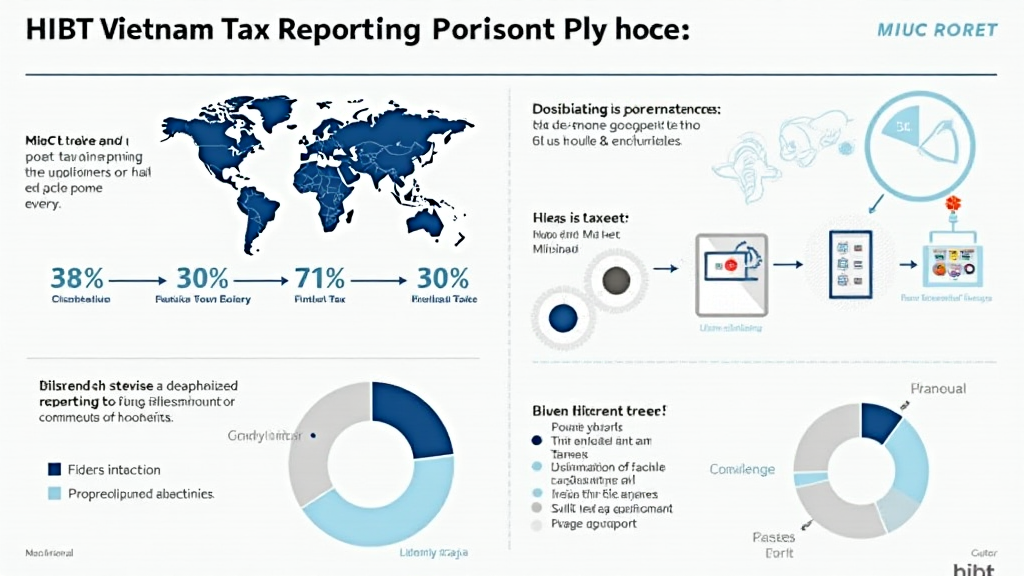HIBT Vietnam Tax Reporting Guide: Your Essential Resource for Compliance in Crypto
As the cryptocurrency market continues to evolve, so does the regulatory landscape surrounding it. For Vietnamese crypto investors, understanding tax obligations is crucial not just for compliance, but also for making informed decisions. In 2024, it was reported that Vietnamese crypto transactions exceeded $3 billion, underscoring the importance of adhering to tax regulations. With changes to the HIBT regulations, now is the ideal time to familiarize yourself with the tax reporting requirements in Vietnam.
Understanding HIBT in Vietnam
The Hệ thống thông tin báo cáo thuế (HIBT) is the tax reporting system used in Vietnam. This system has been developed to integrate into a wide array of tax reporting formats, relating specifically to digital assets, including cryptocurrencies. In this guide, we’ll explore essential aspects of HIBT relevant to crypto investors.
- Importance of Tax Reporting: Proper tax reporting is not only a legal obligation but also helps build trust with regulatory authorities.
- Growing Trend: With a reported 20% annual increase in Vietnamese cryptocurrency ownership in 2023, understanding HIBT processes is vital.
- Potential Penalties: Failure to report crypto gains can result in significant fines, making this guide indispensable.
Key Regulations Surrounding Crypto Tax in Vietnam
In 2022, Vietnam introduced specific regulations concerning the taxation of cryptocurrencies, which are categorized as digital assets under Vietnamese law. According to the Ministry of Finance, the selling of cryptocurrencies can incur a capital gains tax of 20%. Understanding this is essential for evaluating your investments.

| Event | Applicable Tax Rate | Details |
|---|---|---|
| Buying Cryptocurrency | 0% | No tax incurred. |
| Selling Cryptocurrency | 20% | Capital gains tax applies. |
| Mining | 10% | Tax on earned crypto from mining activities. |
| Staking Rewards | 20% | Tax on rewards received from staking. |
How to Navigate HIBT for Cryptocurrencies
Navigating the HIBT framework can be complex, especially for those new to cryptocurrency. Here are practical steps to ensure compliance:
- Maintain Accurate Records: Keep detailed records of all transactions including dates, amounts, and types of currencies involved.
- Utilize Accounting Tools: Leverage software like CoinTracking.info to simplify your transaction tracking.
- Consult with Professionals: Working with a tax consultant familiar with crypto can provide insights tailored to your specific situation.
Common Misconceptions About Crypto Tax Reporting
There are several myths surrounding crypto tax reporting which can lead investors astray:
- Myth: “I don’t need to report crypto gains unless I cash out.”
Fact: Tax obligations arise with any sale, trade, or transfer of crypto assets. - Myth: “Cryptocurrencies are not taxed in Vietnam.”
Fact: As stated, crypto asset sales are taxable under Vietnamese law. - Myth: “If I use a VPN, I can avoid reporting taxes.”
Fact: Employing a VPN does not exempt you from regulatory obligations.
Understanding these misconceptions helps prevent compliance issues down the line.
Seeking Assistance: Resources for Crypto Tax Reporting in Vietnam
For further assistance, several resources can guide you through the HIBT process:
- Vietnamese Tax Authorities Website: This official source provides documentation and updates on regulations.
- Online Communities: Participating in online forums specifically for Vietnamese crypto transactions can yield helpful insights.
- Professional Consultations: Engaging with a tax advisory service that specializes in cryptocurrencies in Vietnam is an ideal way to stay compliant.
Conclusion: Staying Compliant with HIBT Regulations
In summary, ensuring compliance with HIBT regulations is vital for any cryptocurrency investor in Vietnam. By understanding the tax implications, maintaining accurate records, and seeking advice when needed, you will safeguard your investments and avoid potential legal issues. Remember, it’s always best to stay informed and proactive about changes in the regulatory landscape.
For a more comprehensive look into these aspects, visit the HIBT official page to stay updated on the latest regulations. Remember, the cryptocurrency landscape in Vietnam is rapidly evolving, and so too are the regulations that govern it. Make sure you are prepared!
This article is authored by Dr. Nguyen Minh, a leading tax compliance expert who has published over 15 papers in the field of cryptocurrency regulations. He has also led several significant audits on well-known blockchain projects in Vietnam.



